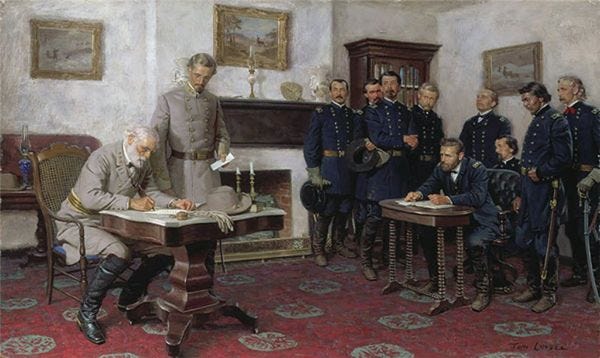It's Appomattox Day. The South Lost. Deal With It.
One hundred fifty years ago today, the American Civil War ended with Robert E. Lee's surrender to Ulysses S. Grant at Appomattox Court House, which wasn't a courthouse but a town named after a court house, and the actual house belonged to Wilmer McLean. This is generally considered a fortunate thing, since "The Surrender At Wilmer's Place" would not look nearly as good on a commemorative print. The relentless romanticizing of the Southern cause -- state's rights, the Old Noble Ways, the Southern Aristocracy, and the Fight for Freedom for people of a certain pale hue -- started well before the war, and the mere fact of Southern defeat did little to slow it. After all, what's more romantic than a Lost Cause? It was a good enough reason for a delusional actor to shoot Abraham Lincoln just a week later, and it was a good enough pile of romantic mush to keep the Lost Cause ideology alive long after the Confederacy and all its leaders and followers were dead and in the ground.
If you're in the mood for an awfully good thinky piece about the survival of Confederate ideology into a century when no one mourns other briefly existing nations of the 19th century -- we'll bet nobody has the flag of the Confederation of the Rhine (1806-1813) on a bumper sticker -- check out this terrific essay in Politico Magazine by Euan Hague. Hague notes that it's not just a benign interest in Southern genealogy that draws modern Confederate sympathizers to get passionate about putting the Confederate battle flag on state license plates, and also cautions that it shouldn't be "simplistically understood solely as an exhibition of racism, although the power of the Confederate flag to convey white supremacist beliefs cannot be discounted."
After all, if the Confederate flag were solely an expression of racism, then people who proudly display the Confederate flag would also have no qualms about openly wearing Klan hoods and other more overt symbols of white supremacy. Those racist symbols are shunned, but the banner of Nathan Bedford Forest still sells pretty well. What makes Hague's essay so effective is that, while keeping in mind the Civil War definitely was about slavery and the racist baggage of the Confederate flag can't be washed away, he also looks at the broader appeal of Confederate nostalgia and kitsch:
Rather, displaying the Confederate flag in 2015 is an indicator of a complex and reactionary politics that is very much alive in America today. It is a politics that harks back to the South’s proud stand in the Civil War as a way of rallying opinion against the federal government—and against the country’s changing demographic, economic, and moral character, of which Washington is often seen as the malign author. Today’s understanding of the Confederacy by its supporters is thus neither nostalgia, nor mere heritage; rather Confederate sympathy in 2015 is a well-funded and active political movement (which, in turn, supports a lucrative Confederate memorabilia industry).
Without ever agreeing with the ideology driving Confederate nostalgia, Hague does a compelling job of getting inside the heads of those who argue, with all apparent sincerity, that "it's about Heritage, not Hate." And of course, arguing that is actually fairly easy if you just sprinkle in enough denial and focus only on the romantic crap, which in turn is also a lot easier if you can feel terribly aggrieved about the corrupt Yankees who "invaded" the South and spoiled all the good stuff. Just shunt slavery aside and pretend that the South seceded over tariffs, or taxation, or States' Rights. It also helps if you can convince yourself that slavery wasn't all that bad after all, or if you are persuaded that Big Government is just a new kind of slavery that has entrapped everyone, not just The Blacks (but especially The Blacks, who are enslaved on the Democrat Plantation).
What we're getting at here is that Hague's article is a terrific read and you should go read it. And it looks like we're headed over to the Great Big Online Store to buy a copy of the anthology that Euan Hague co-edited with Edward H. Sebesta and Heidi Beirich: Neo-Confederacy: A Critical Introduction (University of Texas, 2008).
Oh, and also, as we always note on solemn occasions like this, neo-Confederate groups like the League of the South can go fuck themselves. Wouldn't want to leave that unsaid.
[contextly_sidebar id="1LXilPknqa5xm5n4dMp97VFehxT7mZI9"]




I don't know what your comment means chicken thief, please explain.
Yes, I agree. I hope you read the entire speech. If not yet, I encourage you and others to please do so. I believe this speech proves the war WAS about slavery and all the ugliness that went with it. What was said proudly and in public in 1861, is still whispered proudly in private conversations in 2015.